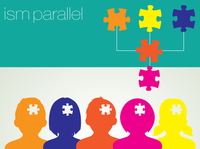|
ISM Parallel extends the usability of ISM Software because it allows participants to continue structuring a MAP and/or structure from scratch their own MAP. ISM Matrices can then be "added" mathematically using the same criteria as in a regular session, i.e., super majority agreement, to produce the minimal agreement matrix.
The Need
Due to the time constraints of participants there is often not enough time to complete the mapping process and enrich the map with as many ideas as possible. This is mainly due to lack of time or the difficulty of arranging a new meeting especially if the dialogue is conducted remotely. Therefore, the users need a special tool to allow this without any further meetings. Furthermore, this tool can be seen as a door opening many prospects in conducting hybrid dialogues.
Description
During the structured dialogue process the group of participants explore the influence of the relationships between pairs of their statements/ideas in order to construct an influence tree. The process utilizes the CogniScope software which assists in automatically producing reports that explain the ideas and the connections among the ideas as they emerge from the dialogue. ISM parallel comes to extend this process by giving participants the option to continue the mapping process individually and asynchronously in order to develop their own map. So the algorithm behind - called ISM algorithm - computes a series of yes/no questions and for each question the user/participant chooses a "Yes" or "No" answer. Then the algorithm constructs a binary matrix for entering the responses. As the process proceeds the algorithm makes logical inferences based upon the responses already given and completes some cells of the matrix automatically. After the question phase the algorithm extracts a multilevel digraph which clarifies the statements/ideas and the interrelations among the statements as they emerge from the participant's answers. Eventually, after the completion of the process by all participants individual maps are collected and summed to produce a final map including all the responses that took the majority.
Innovation
Our tool is the first and unique tool in the whole planet! As there are only few pioneers - MIT center for collective intelligence, Wisdom Research Network of University of Chicago, Future Worlds Center for collective wisdom - it could be the most competitive product in the world. Furthermore, ISM parallel could assist hybrid dialogues because the mapping process could be conducted asynchronously. In other words you can complete the process individually anytime anywhere and when it is complete by all participants then you can see the resulting map just fetching individual maps together.
